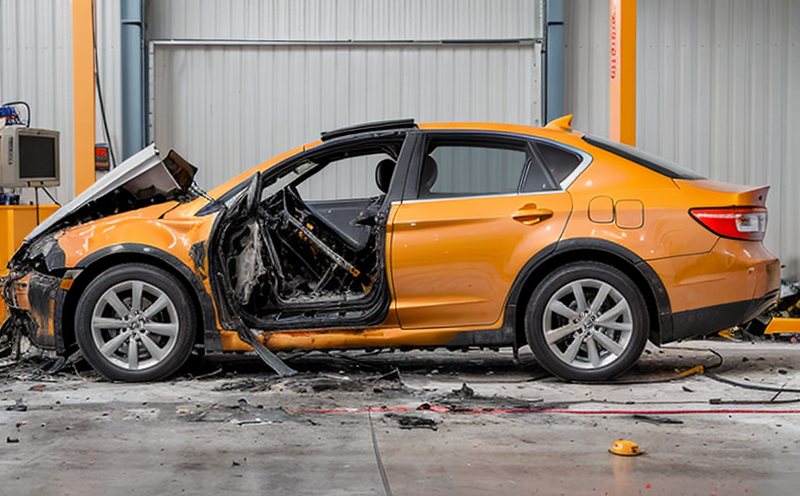SAE J2464 Abuse Testing of EV Battery Systems for Mechanical Crash Conditions
The SAE J2464 standard provides a comprehensive framework to evaluate the safety and reliability of electric vehicle (EV) battery systems under mechanical abuse conditions, specifically focusing on crash scenarios. This testing ensures that batteries are robust enough to withstand potential impacts without compromising safety or performance.
Battery abuse tests are critical in the development cycle of EVs as they help identify potential weaknesses in design and materials. These tests simulate real-world situations such as vehicle crashes, where the battery may experience severe mechanical stress. The SAE J2464 standard covers various types of abuse testing, including crush, drop, vibration, and impact tests.
The test setup involves placing a battery module or pack within a controlled environment that mimics the conditions it would encounter during a crash. Instruments measure parameters like temperature, voltage, current, and pressure throughout the test to assess the battery’s response. The goal is to ensure that the battery maintains its integrity and safety features under these extreme conditions.
One of the key aspects of SAE J2464 testing is the use of real-world crash data to inform the test procedures. This ensures that the tests are relevant and applicable to actual vehicle crashes. By replicating the forces and accelerations experienced during a collision, engineers can identify potential vulnerabilities in battery design.
The standard also emphasizes the importance of post-test inspections to evaluate any changes in the battery’s physical structure or internal components. These inspections help determine if the abuse has compromised the battery's safety features or performance capabilities. Post-mortem analysis is crucial for continuous improvement and refining the design process.
Compliance with SAE J2464 not only ensures product quality but also enhances market confidence in EVs by demonstrating a commitment to safety standards. This can be particularly beneficial for manufacturers looking to differentiate their products in competitive markets.
In summary, SAE J2464 abuse testing is an essential step in the development and certification of safe and reliable EV battery systems. By simulating real-world crash conditions, this standard helps ensure that batteries perform consistently under extreme stress, thereby protecting both passengers and the environment.
Why It Matters
The importance of SAE J2464 abuse testing cannot be overstated in today’s rapidly evolving electric vehicle market. Safety is paramount when it comes to EVs, as they rely heavily on battery systems for their operation and performance. Ensuring that these batteries can withstand mechanical abuse, such as those encountered during a crash, is critical to maintaining the integrity of the entire vehicle.
Crash conditions are particularly challenging because they involve sudden and intense forces that could potentially damage the battery pack. Without proper testing, there’s a risk that a battery might fail catastrophically under these circumstances, leading to safety hazards or even fires. This not only poses risks to passengers but also to bystanders and emergency responders.
By adhering to SAE J2464 standards, manufacturers can demonstrate their commitment to producing safe and reliable EVs. This compliance helps build trust with consumers who are increasingly concerned about the safety of electric vehicles. It also ensures that products meet regulatory requirements, which is essential for market entry in many countries.
In addition to enhancing consumer confidence, SAE J2464 testing contributes significantly to reducing liability risks for manufacturers and insurers. By proving that batteries have been rigorously tested and found safe under abuse conditions, companies can mitigate the potential for product liability claims. This is especially important as the number of EVs on the road continues to grow.
Furthermore, SAE J2464 testing plays a role in advancing the technology itself. Through repeated tests and analysis, engineers can refine battery designs, improve materials, and enhance overall safety features. This continuous improvement cycle contributes to the development of safer and more efficient EVs, ultimately benefiting all stakeholders involved.
In conclusion, SAE J2464 abuse testing is not just a compliance requirement; it’s a critical step in ensuring the safety and reliability of electric vehicles. By addressing potential vulnerabilities early in the design process, manufacturers can create products that meet high standards of safety while also meeting market expectations for innovation and performance.
Industry Applications
- Electric Vehicle Manufacturers: Ensure compliance with international safety standards.
- Battery Suppliers: Validate the durability and reliability of their products under abuse conditions.
- R&D Engineers: Refine designs and materials to meet stringent safety criteria.
- Quality Control Managers: Verify that production batches adhere to SAE J2464 specifications.
- Compliance Officers: Ensure regulatory compliance for market entry.
The application of SAE J2464 abuse testing extends beyond the automotive industry. It is also applicable in other sectors where high-energy batteries are used, such as aerospace, military, and consumer electronics. In these industries, the ability to withstand mechanical stress is critical for ensuring safe operation.
Customer Impact and Satisfaction
The implementation of SAE J2464 abuse testing has a direct impact on customer satisfaction by enhancing trust in the safety and reliability of electric vehicles. When consumers know that their EVs have been rigorously tested under extreme conditions, they are more likely to feel confident about purchasing and using these products.
From an operational perspective, SAE J2464 testing ensures that vehicles meet regulatory requirements, reducing the risk of recalls or product liability issues. This can lead to lower maintenance costs for manufacturers and higher customer satisfaction rates overall.
In addition to improving safety, SAE J2464 abuse testing also contributes to environmental sustainability by promoting the use of safer batteries with longer lifespans. By identifying and addressing potential weaknesses early in the development process, these tests help reduce waste and promote recycling practices within the industry.
Ultimately, adherence to SAE J2464 standards demonstrates a company’s commitment to quality and safety, which is increasingly important as EVs become more integrated into daily life. This commitment not only benefits customers but also contributes to the broader goal of building safer, more sustainable transportation systems.





